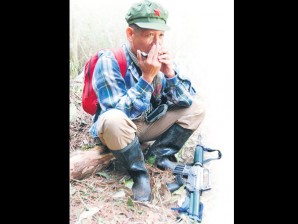
‘THE SINGING TERRORIST’ The death of Gregorio “Ka Roger” Rosal was announced Sunday by the Communist Party of the Philippines. Rosal dubbed himself “the singing terrorist.” JOAN BONDOC
The Communist Party of the Philippines (CPP) on Sunday finally announced the death four months ago of its former spokesperson, Gregorio Rosal, popularly known as “Ka Roger.”
“Ka Roger passed away on June 22, 2011, at the age of 64 after suffering a heart attack in a guerrilla front in Luzon,” the CPP Central Committee said in a statement sent to the
Inquirer.
The CPP website (www.philippinerevolution.net) carried a black and white portrait of the man who for many years served as the face of the rebel organization and its armed component, the New People’s Army (NPA). Above the portrait were the words, “Gregorio ‘Ka Roger’ Rosal, 1947-2011.”
The condition of the Mao cap-wearing rebel leader had long been the subject of speculation after the Armed Forces of the Philippines and the Philippine National Police repeatedly reported that they had received information Rosal had died of a lingering illness two years ago.
But the military failed to confirm its veracity.
Explanation for delay
The CPP attributed the delay in announcing the death of Rosal, a native of Ibaan town in Batangas, to “intense military operations” which prevented party organs from informing his daughters immediately.
“Ka Roger’s siblings have also been informed of his passing,” the CPP said on the website.
A son of impoverished sugar plantation workers, Rosal became a trade union organizer and student activist before going underground in the mountainous Quezon province in the 1970s.
He was captured a year after the dictator Ferdinand Marcos imposed martial law in 1972, but escaped months later.
Rosal was among guerrilla leaders subjected to an unspecified punishment by the rebels for failing to take a strong stand against an internal purge of suspected military spies in the late 1980s.
Rosal served as rebel spokesperson from the 1980s to the 1990s, using laptop computers, two-way radios and cellphones to bring guerrilla statements to households through radio and TV interviews. He often arranged visits for journalists to rebel encampments, regaling them by playing his harmonica.
‘Singing terrorist’
After a news conference in a pine-clad northern forest in 2004, Rosal pulled out his harmonica. “I’ll provide the caption for you: the singing terrorist,” he said as photographers captured the moment.
After the Sept. 11, 2001, terrorist attacks on the United States, the Filipino guerrillas became a target of the US-led global war on terror. Washington placed them on its list of terrorist organizations.
Luis Jalandoni, the Netherlands-based spokesperson of the National Democratic Front (NDF), the political arm of the CPP, said Rosal was the effective voice of the revolution.
“He was so loved by the masses,” he said.
Alex Padilla, the government’s chief negotiator in the peace talks with the rebels, said the last time the government panel asked its counterpart about reports of Rosal’s death was in February. The NDF had said then that Rosal was alive and well, he said.
“I guess his death was a loss for the movement,” Padilla said.
Malacañang did not comment on the report.
Series of strokes
The CPP said Rosal suffered his first stroke in 1997 but was able to recover and return to his work.
“He suffered his second stroke in 2000 and had to go on leave for a few months. But as he did after his first attack, he strove to return to his revolutionary work in the countryside,” it said.
Rosal again suffered a stroke on May 1, 2006, which caused him more damage. It “led to the gradual deterioration of his condition until it became impossible for him to resume his previous tasks,” the CPP statement said.
“From 2006 to 2011, Ka Roger was cared for by a team of comrades who ensured his security, medical needs and quality of life. Although he could no longer assume his usual responsibilities, he kept in close touch with the Information Bureau and was consulted from time to time on its work,” the CPP said.
Even with his disabilities, Rosal still woke up at dawn to listen to the news, it said.
“At times, he was able to review statements issued by the party. He was deeply concerned upon hearing about media killings and about the deaths of several reporters in the Maguindanao massacre in November 2009,” the group said.
Offers of medical aid
“Ka Roger spurned offers of medical assistance from the AFP. He was aware that these were traps and saw the hypocrisy behind them, as the military never withdrew the bounty on his head and relentlessly pursued operations for his capture,” the CPP said.
The last time Rosal issued his New Year greetings was in January.
On its website, the CPP said that on October 15, all units of the NPA would fall in formation to pay tribute to Ka Roger.
“At exactly 12 noon, they will carry out a gun salute in his memory. All units of the CPP and revolutionary mass organizations are enjoined to launch tribute meetings to remember Ka Roger and his contributions to the historic revolutionary struggles of the Filipino people,” the group said.
Condolences
The AFP extended its condolences to Rosal’s family.
“When the information about the lingering illness of Rosal reached the AFP, the leadership of the AFP through Southern Luzon Command commander Lieutenant General Roland Detabali immediately offered medical treatment upon his return to the government fold,” said Colonel Arnulfo Burgos Jr., the military public affairs chief.
“May his demise provide opportunities for enlightenment to some of our misguided brothers and sisters who continue to resort to armed struggle as a means to achieve their interests,” Burgos said. With a report from AP
Originally posted: 5:43 pm | Sunday, October 9th, 2011

